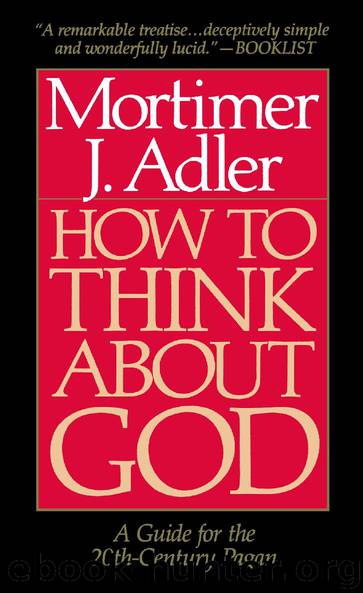How to Think About God by Mortimer J. Adler

Author:Mortimer J. Adler
Language: eng
Format: epub
Publisher: Touchstone
CHAPTER 10
On Inferring Existence
ALL PROPOSITIONS or judgments which assert that something is the case fall into two main groups. They are either existential or non-existential. They either do or do not assert the existence of something.
When we say “mermaids have tails” and “horses have tails” we are saying something about the characteristics of mermaids and horses, not that there are horses or mermaids. Such judgments must be expressed in additional statements to that effect, either by saying “horses exist” or by saying what is strictly equivalent, “there are horses.”
Existential propositions can be further subdivided. “Horses exist” or “there are horses” exemplifies one type of existential proposition. This type asserts the existence of entities, in the plural, which are instances of a class that has been defined.
Defining the class to which horses or the class to which mermaids belong does not tell us whether or not that class has any members in the real world. If there are none, then we say that the class is a null or empty class, as are all classes the members of which are, like mermaids, nothing more than imaginary objects or objects of thought. Only if we know that particular instances of the class do in fact exist are we in a position to declare that the class is not empty or null. Such knowledge is expressed, for example, in the general existential proposition “horses exist” or “there are horses.”
The other type of existential proposition is singular, not general. This type asserts or denies the existence in reality of a unique, singular object, designated by a proper name or a definite description. For example, we can say that Hamlet, the leading character in a play by Shakespeare, did not exist at the time that Shakespeare wrote about him. We can say that Shakespeare was real—that he existed in the era of Queen Elizabeth I. Such existential propositions may be in the past tense, like the foregoing statements, or they may be in the present tense (“There is no king of France at the present moment”) or in the future tense (“The house for which these are the architectural plans will exist on this spot next year”).
The proposition “God exists” is an existential proposition of the second type. Yet it is also like the general existential proposition “electrons exist” or “there are electrons,” because it asserts the existence in reality of an object of thought (the notion of which is a theoretical construct)—an object of thought that is not also a perceptual object. But, unlike “electrons exist,” the proposition “God exists” asserts the existence of a unique singular that is not a particular instance of a certain class of objects.
Among all existential propositions, the proposition “God exists” stands alone. For the reasons given above, it is a unique proposition, even as the word “God” is unique among proper names. Nevertheless, as we will see, the proposition resembles all other existential propositions in two negative respects: (1) It is not self-evidently true or false; (2) it is not necessarily true or false.
Download
This site does not store any files on its server. We only index and link to content provided by other sites. Please contact the content providers to delete copyright contents if any and email us, we'll remove relevant links or contents immediately.
The remains of the day by Kazuo Ishiguro(8997)
Tools of Titans by Timothy Ferriss(8393)
Giovanni's Room by James Baldwin(7345)
The Black Swan by Nassim Nicholas Taleb(7128)
Inner Engineering: A Yogi's Guide to Joy by Sadhguru(6792)
The Way of Zen by Alan W. Watts(6614)
The Power of Now: A Guide to Spiritual Enlightenment by Eckhart Tolle(5781)
Asking the Right Questions: A Guide to Critical Thinking by M. Neil Browne & Stuart M. Keeley(5771)
The Six Wives Of Henry VIII (WOMEN IN HISTORY) by Fraser Antonia(5514)
Astrophysics for People in a Hurry by Neil DeGrasse Tyson(5189)
Housekeeping by Marilynne Robinson(4445)
12 Rules for Life by Jordan B. Peterson(4303)
Ikigai by Héctor García & Francesc Miralles(4273)
Double Down (Diary of a Wimpy Kid Book 11) by Jeff Kinney(4268)
The Ethical Slut by Janet W. Hardy(4251)
Skin in the Game by Nassim Nicholas Taleb(4248)
The Art of Happiness by The Dalai Lama(4129)
Skin in the Game: Hidden Asymmetries in Daily Life by Nassim Nicholas Taleb(4004)
Walking by Henry David Thoreau(3959)
